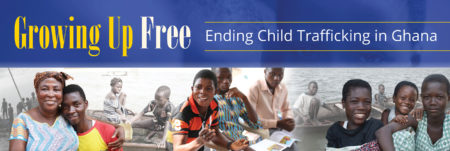Journalists have an important role to play in the effort to address child trafficking in Ghana. They can spread awareness with government officials and the general public that children are forced to work in hazardous conditions. They can explain the difference between acceptable forms of child work and illegal forced labor. And they can showcase efforts that are underway to liberate children, help them recover, and return them to normal life.
That’s why our Growing Up Free project in Kumasi recently brought 13 journalists together for two days of intensive training on the state of child trafficking in Ghana and how the news media can make a difference.
The journalists came from diverse backgrounds in print, radio and online media. They were drawn from six regions: Central, Eastern, Volta, Oti, Bono East and Greater Accra. These are regions where Free the Slaves is implementing a Child Protection Compact between the U.S. and Ghanaian governments. The compact, a first-of-its-kind government-to-government partnership, is combating child trafficking in the fishing sector in these regions.
The workshop focused on three key areas: 1) understanding the scope and drivers of child trafficking, both globally and in Ghana, and community-based efforts to confront it; 2) understanding how activists, physicians, psychologists, teachers and social workers team-up to help child trafficking survivors resume normal lives after liberation; 3) how to cover these issues in constructive ways that make news headlines, aren’t sensationalistic, and deepen public discussion and understanding of child trafficking. One highlight of the session was an on-the-record news briefing by several of our Ghana partner organizations.
The workshop generated headlines right away!
See also: Journalists Receive Human Trafficking Tips and Free the Slaves Engages Media on Human Trafficking and Slavery. The Free the Slaves team was also interviewed on Kachi-FM.
As the workshop closed, participants showed excitement for the future. Each journalist developed a reporting work plan with key headlines, issues, sources, questions and locations to visit during the rest of 2020.




